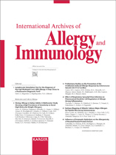
INTERNATIONAL ARCHIVES OF ALLERGY AND IMMUNOLOGY
Scope & Guideline
Connecting Researchers and Clinicians in Allergy Science.
Introduction
Aims and Scopes
- Clinical and Experimental Allergy Research:
The journal publishes studies that explore the mechanisms underlying allergic diseases, including asthma, rhinitis, and food allergies, utilizing both clinical trials and experimental models. - Immunotherapy and Treatment Approaches:
A significant focus is on the efficacy and safety of immunotherapy techniques, including subcutaneous and sublingual routes, in treating various allergic conditions. - Epidemiology and Public Health:
The journal addresses the prevalence, risk factors, and public health implications of allergic diseases across diverse populations, contributing to a better understanding of environmental and genetic influences. - Innovative Diagnostic Techniques:
Research on novel diagnostic methods, including component-resolved diagnostics and molecular allergy testing, is a key area, aimed at improving accuracy in allergy diagnosis. - Molecular and Cellular Mechanisms:
Studies investigating the cellular and molecular pathways involved in immune responses and allergic reactions, including cytokine profiles, T cell differentiation, and the role of microbiota. - Emerging Allergens and Sensitization Patterns:
The journal also emphasizes research on newly identified allergens and changing patterns of sensitization, particularly in the context of global environmental changes.
Trending and Emerging
- Impact of COVID-19 on Allergic Conditions:
Research exploring the effects of the COVID-19 pandemic on the prevalence and management of allergic diseases has surged, highlighting the need for understanding how respiratory viral infections influence allergic responses. - Biologic Therapies and Their Applications:
There is a growing body of literature focusing on the use of biologic therapies for severe allergic conditions, such as chronic urticaria and eosinophilic asthma, indicating a shift towards targeted treatments. - Microbiome Research in Allergy:
Emerging studies are increasingly investigating the role of the microbiome in the development and exacerbation of allergic diseases, suggesting new avenues for prevention and treatment. - Artificial Intelligence and Machine Learning in Allergy Diagnosis:
The integration of AI and machine learning in predicting allergic responses and optimizing treatment protocols is becoming a prominent theme, reflecting technological advancements in the field. - Environmental Influences on Allergy Development:
Research is expanding to include the effects of climate change, urbanization, and dietary shifts on the prevalence of allergic diseases, indicating a holistic approach to understanding allergies. - Personalized Medicine in Allergy Treatment:
A trend towards personalized approaches in the management of allergic diseases is evident, with studies focusing on genetic and immunological markers that predict responses to specific therapies.
Declining or Waning
- Traditional Allergen Testing Methods:
There has been a noticeable decline in studies focusing on conventional skin prick testing and serological methods, as newer, more precise diagnostic techniques gain traction. - Single-Factor Allergy Studies:
Research centered around isolated allergens without considering poly-sensitization or environmental interactions seems to be diminishing, as the complexity of allergic diseases is increasingly recognized. - Generalized Treatment Protocols:
Studies advocating for one-size-fits-all treatment approaches, particularly in immunotherapy, are less frequent as personalized medicine becomes more prominent. - Basic Immunology without Clinical Application:
Research focused solely on basic immunological concepts without direct clinical applications or implications is declining, in favor of studies that bridge laboratory findings with clinical practice. - Non-Evidence-Based Dietary Interventions:
There is a waning interest in dietary approaches for allergy management that lack robust evidence or clinical validation, as the focus shifts to more scientifically grounded interventions.
Similar Journals
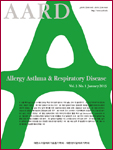
Allergy Asthma & Respiratory Disease
Bridging science and practice in respiratory medicine.Allergy Asthma & Respiratory Disease is a pioneering journal dedicated to advancing research and clinical practice in the fields of allergy, asthma, and related respiratory diseases. Published by the esteemed Korean Academy of Asthma Allergy & Clinical Immunology, this journal aims to disseminate high-quality, peer-reviewed articles that contribute to the understanding, diagnosis, and treatment of these prevalent health issues. Although it operates under a subscription model, it maintains a robust reputation for being a pivotal resource in respiratory health, attracting authors and researchers worldwide. The journal emphasizes interdisciplinary approaches and encourages submissions that span from molecular biology to public health perspectives, making it a vital platform for professionals, researchers, and students eager to deepen their knowledge in respiratory medicine. With a commitment to fostering academic discourse in South Korea and beyond, Allergy Asthma & Respiratory Disease is positioned as a significant contributor to the global conversation on respiratory health.

Asia Pacific Allergy
Unveiling New Perspectives in Allergy and ImmunologyAsia Pacific Allergy, published by Lippincott Williams & Wilkins, is a prominent academic journal dedicated to advancing research and clinical practice in the fields of dermatology, immunology, and allergy. With its ISSN 2233-8276 and E-ISSN 2233-8268, the journal provides a platform for innovative studies and reviews that cater to an international audience of researchers, healthcare professionals, and students involved in allergy and related disorders. Although it does not currently offer open access to its publications, the journal's robust output from 2015 to 2017 and its ongoing contribution to the literature from 2021 to 2024 showcase the evolving landscape of allergy research in the Asia Pacific region. Recognized in the 2023 Journal Citation Reports, it holds a Q2 ranking in Dermatology and a Q3 ranking in Immunology and Allergy, while its Scopus ranks further emphasize its significance within these domains, positioning it among the top journals in the field. As a source of cutting-edge research, Asia Pacific Allergy plays a vital role in fostering collaboration and knowledge dissemination, ultimately assisting in the betterment of patient care and treatment strategies across the region.

Current Allergy & Clinical Immunology
Advancing the frontiers of allergy and immunology.Current Allergy & Clinical Immunology is a vital peer-reviewed journal published by the Allergy Society of South Africa, focused on advancing the field of immunology and allergy medicine. With an ISSN of 1609-3607, this journal offers crucial insights and research findings pertinent to the understanding and treatment of allergic conditions. Operating from South Africa, it features contributions from a diverse range of authors and professionals in the field. Published from 2008 to 2024, the journal plays an essential role in disseminating current knowledge, even as it holds a Q4 ranking in Immunology and Allergy and is positioned at the 4th percentile based on Scopus rankings. While not open access, it remains an important resource for researchers, practitioners, and students looking to stay informed on emerging trends and breakthroughs in allergy and clinical immunology.
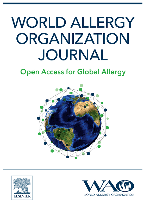
World Allergy Organization Journal
Empowering Knowledge in Allergy and Respiratory MedicineWorld Allergy Organization Journal is a premier open-access publication dedicated to advancing the understanding and treatment of allergic diseases and related conditions. Published by ELSEVIER, this journal boasts a commendable impact factor and ranks in the second quartile for both Immunology and Allergy, as well as the first quartile in Pulmonary and Respiratory Medicine. Since its inception as an open-access journal in 2008, it has consistently aimed to provide a credible platform for researchers, clinicians, and students to disseminate original research, reviews, and clinical studies. With its emphasis on high-quality scholarship and practical applications, the World Allergy Organization Journal plays a crucial role in bridging theoretical knowledge with clinical practice, making significant contributions to the fields of immunology, allergy, and respiratory medicine. The journal is particularly notable for its accessibility to a global audience, exemplified by its open-access model since 2008, promoting a wider exchange of ideas and innovations across borders.
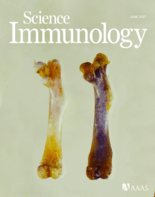
Science Immunology
Advancing the Frontiers of Immune ResearchScience Immunology, published by the American Association for the Advancement of Science, is a leading journal in the field of immunology, recognized for its significant impact and rigor in advancing our understanding of immune responses and complex diseases. With an impressive impact factor that places it in the Q1 category of both immunology and allergy, as well as miscellaneous medicine, this journal is ranked #7 and #8 in their respective Scopus categories, reflecting its high-quality research output. Since its inception in 2016, Science Immunology has been at the forefront of interdisciplinary immunological research, fostering crucial insights that link immunology with pressing health challenges. The journal is committed to providing open access to its content, ensuring that groundbreaking findings are accessible to a global audience of researchers, professionals, and students. Its anthology not only addresses fundamental immunological mechanisms but also enhances the dialogue on translational applications and therapeutic interventions, solidifying its position as an essential resource within the scientific community.

AIMS Allergy and Immunology
Advancing the Frontiers of Allergy and ImmunologyAIMS Allergy and Immunology is a prestigious open access journal dedicated to advancing knowledge in the fields of allergy and immunology. Published by the American Institute of Mathematical Sciences (AIMS), this journal provides a vibrant platform for researchers, practitioners, and scholars to share groundbreaking findings and insights. Recognized for its commitment to disseminating high-quality research since its inception in 2017, AIMS Allergy and Immunology contributes significantly to the understanding of complex immunological mechanisms and allergic responses, thus playing a pivotal role in enhancing clinical practices and therapeutic strategies. With its ISSN 2575-615X, the journal aims to facilitate a robust exchange of ideas and promote collaboration within the scientific community. Researchers and practitioners are encouraged to access the latest studies and reviews, which are all freely available online, ensuring that vital information reaches a global audience without barriers. Together, we can tackle the challenges posed by allergies and immune disorders through rigorous scientific inquiry and innovation.
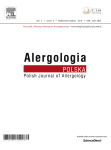
Alergologia Polska-Polish Journal of Allergology
Illuminating the pathways of allergy mechanisms and treatments.Alergologia Polska - Polish Journal of Allergology, published by TERMEDIA PUBLISHING HOUSE LTD, is a distinguished academic journal dedicated to advancing the field of allergy research and treatment. With the ISSN 2353-3854, this journal serves as an essential resource for professionals, researchers, and students alike, offering a platform for the dissemination of novel findings and comprehensive reviews in allergic diseases. The journal emphasizes open access to ensure widespread availability and engagement within the scientific community. Alergologia Polska aims to enhance the understanding of allergy mechanisms, diagnostics, and management strategies, fostering collaboration and innovation among experts in the field. Set against the vibrant backdrop of Poznań, Poland, this publication not only highlights clinical and experimental research but also promotes interdisciplinary discussions that are pivotal for tackling complex allergic conditions globally.
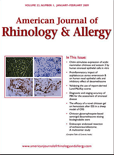
American Journal of Rhinology & Allergy
Exploring innovative therapies for respiratory health.Welcome to the American Journal of Rhinology & Allergy, a leading publication in the fields of otolaryngology and immunology, published by SAGE Publications Inc. Since its inception in 2009, this journal has played a pivotal role in disseminating cutting-edge research and reviews, addressing critical topics related to sinus disease, allergic disorders, and respiratory health. With an impressive Scopus ranking that places it in the top quartiles of both immunology and medicine, the journal garners about a 90th percentile ranking in otorhinolaryngology, reflecting its significance in advancing medical knowledge and clinical practice. The American Journal of Rhinology & Allergy aims to bridge the gap between laboratory research and clinical application, providing a platform for researchers and professionals to explore innovative therapies and treatment protocols. Access options include traditional subscription models to ensure comprehensive support for the academic community. Join our efforts to enhance understanding and treatment in the critical area of rhinology and allergy.

Egyptian Journal of Pediatric Allergy and Immunology
Fostering excellence in pediatric allergy and immunology research.Welcome to the Egyptian Journal of Pediatric Allergy and Immunology, a leading academic platform dedicated to the advancement of knowledge in the field of pediatric allergy and immunology. Published by the prestigious Egyptian Society of Pediatric Allergy & Immunology, this journal aims to address the pressing challenges and breakthroughs in the diagnosis, treatment, and management of allergic diseases in children. As a crucial resource for researchers, healthcare professionals, and students, it focuses on disseminating high-quality, peer-reviewed articles that contribute to the global understanding of allergic conditions and immunological responses in pediatric populations. Although the journal is currently not an Open Access publication, it provides a valuable gateway to research findings that can shape clinical practice and influence future investigations. With an emphasis on contributing to improved healthcare outcomes for children suffering from allergy and immunology disorders, the Egyptian Journal of Pediatric Allergy and Immunology stands out as an essential reference in the field.

Allergy Asthma and Clinical Immunology
Transforming immunological insights into clinical practice.Allergy Asthma and Clinical Immunology, a pioneering open access journal published by BMC, has been at the forefront of immunological research since its inception in 2005. With an ISSN of 1710-1492, this UK-based journal has established a significant presence in the fields of Immunology, Allergy, and Pulmonary and Respiratory Medicine, achieving notable quartile rankings such as Q2 in Immunology and Allergy in 2023. It plays a crucial role in disseminating high-quality research that advances our understanding of allergy and asthma, making substantial contributions to clinical practices and public health. The journal embraces the principles of Open Access, allowing researchers, professionals, and students from around the globe to access its content freely, thus facilitating knowledge sharing and collaboration within the scientific community. As it converges towards 2024, Allergy Asthma and Clinical Immunology continues to attract impactful studies that drive innovation and improve patient care in the face of rapidly evolving challenges in immunological health.